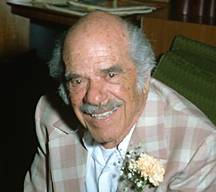
 Frank
Capra (1897-1991), American motion-picture director and producer,
noted for his idealistic comedies. Born in Palermo, Italy, Capra was six
years old when his family immigrated to the United States, settling in
Los Angeles. His first important job in Hollywood, California, was as
a writer for the Mack Sennett studios. He subsequently worked as a scriptwriter
and director for comedian Harry Langdon, directing Langdon's three best
films, notably Strong Man (1926). Capra later joined Columbia Pictures,
where he gained his greatest success as a director of comedies that had
appealing characters, social and political themes, and happy endings.
These films include three that won Capra Academy Awards for best director:
It Happened One Night (1934), Mr. Deeds Goes to Town (1936), and You Can't
Take It With You (1938). During World War II (1939-1945), Capra produced
military documentaries. Other films he directed include Platinum Blonde
(1931), The Bitter Tea of General Yen (1933), Lost Horizon (1937), Mr.
Smith Goes to Washington (1939), Arsenic and Old Lace (1944), It's a Wonderful
Life (1946), State of the Union (1948), Here Comes the Groom (1951), and
Pocketful of Miracles (1961; a remake of his 1933 film Lady for a Day);
most of these films he also produced. It's a Wonderful Life, a box-office
failure in 1946, later acquired a small but enthusiastic following. By
the late 1980s the film was being shown every year at Christmas, although
it had been allowed to fall into public domain and Capra received no royalties
from its belated success. His autobiography, The Name Above the Title,
was published in 1971 (reprinted, 1985).
Frank
Capra (1897-1991), American motion-picture director and producer,
noted for his idealistic comedies. Born in Palermo, Italy, Capra was six
years old when his family immigrated to the United States, settling in
Los Angeles. His first important job in Hollywood, California, was as
a writer for the Mack Sennett studios. He subsequently worked as a scriptwriter
and director for comedian Harry Langdon, directing Langdon's three best
films, notably Strong Man (1926). Capra later joined Columbia Pictures,
where he gained his greatest success as a director of comedies that had
appealing characters, social and political themes, and happy endings.
These films include three that won Capra Academy Awards for best director:
It Happened One Night (1934), Mr. Deeds Goes to Town (1936), and You Can't
Take It With You (1938). During World War II (1939-1945), Capra produced
military documentaries. Other films he directed include Platinum Blonde
(1931), The Bitter Tea of General Yen (1933), Lost Horizon (1937), Mr.
Smith Goes to Washington (1939), Arsenic and Old Lace (1944), It's a Wonderful
Life (1946), State of the Union (1948), Here Comes the Groom (1951), and
Pocketful of Miracles (1961; a remake of his 1933 film Lady for a Day);
most of these films he also produced. It's a Wonderful Life, a box-office
failure in 1946, later acquired a small but enthusiastic following. By
the late 1980s the film was being shown every year at Christmas, although
it had been allowed to fall into public domain and Capra received no royalties
from its belated success. His autobiography, The Name Above the Title,
was published in 1971 (reprinted, 1985).
(Source: Microsoft¨ Encarta¨ Online Encyclopedia 2000 © 1997-2000 Microsoft Corporation. All rights reserved.)
For more information, see www.cassavetes.com